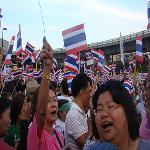19 April 2010

Photo: VOA - R. Corben
'No-color' pro-government rally in Bangkok 18 April 2010
After weeks of anti-government protests in Thailand, new groups are rising in support of the government. These new, so-called "no color" protests reflect growing unease among Bangkok residents over the rising political tensions and fears of bloodshed.
To the sound of patriotic music and song thousands of pro-government supporters rallied in central Bangkok Sunday calling for a peaceful resolution to six weeks of anti-government protests.
Under a monument marking Thailand's past wars, demonstrators displayed large posters of King Bhumipol Adulyadej and waved flags.
One protester, Mrs. Kwan, came to support the monarchy. She fears for the future of the country.
"I don't like violence. See that picture? [Yes the King]. I came out for him also," she said. "I see no end in the near future unless something really drastic happens."
These are the no-color protesters. Most are from the urban middle class, and they back Prime Minister Abhisit Vejjajiva. They are angry at the anti-government protesters who have choked central Bangkok for nearly six weeks, demanding that Mr. Abhisit resign.
In recent years Thailand's political spectrum has become color-coded. The current anti-government protesters are known as the red shirts, for the clothes they wear.
The red shirts, many from poor and rural regions, support former Prime Minister Thaksin Shinawatra. Their leaders want changes to Thailand's bureaucratic elites and say Mr. Abhisit's government is illegitimate because parliament voted for him, not the public.
On the other side are the yellow shirts, or the People's Alliance for Democracy, which campaigned for nearly a year against former Mr. Thaksin, until a coup ousted him in 2006.
The PAD resumed its protests in 2008 after a pro-Thaksin government won elections in 2007. Yellow shirts occupied government buildings and besieged the country's main international airport, forcing it to close for a week. Not long afterward, courts forced out two pro-Thaksin governments over election-law violations.
On Sunday, the PAD threatened to stage its own rallies unless the government returns peace to the country.
But the no-color demonstrators say they were not directly aligned with the PAD.
"These people are not yellow shirts. It is people who love the king," said one woman. "Maybe some yellow shirts and pink shirts and any shirts - everybody - several shirts not yellow. I'm not yellow shirt, too."
On April 10, 24 people died in street fighting when security forces tried to clear a red shirt rally site. The army warns that it will stop any attempt to expand the protests beyond their main rally point in a major commercial district.
The army and police deployed to the Bangkok's main financial district, Silom Road, Monday, in a show of force aimed at blocking at red shirt march to the area. The protesters called off the march.
Kwanravee Wangudom, a social activist, fears further conflict.
"It's getting very intense after the government declared the emergency decree and there were some killings and people getting injured," she said. "So there's still no way out. So I think it's getting very intense and it's going to be more complicated."
Newspapers here daily report on growing fears of more violence. Increasingly there is talk of a civil war, in part because the ranks of the military and police are divided into the red and yellow camps.
Political analysts say that increases the risk of violence as Thailand copes with its most severe political crisis in 18 years.
While the country hopes calm will return, businesses and residents of Bangkok grow tired of the constant protests. Red shirts control several major roads in the heart of the city. Their rallies have caused six large shopping centers to close, have frightened off tourists at several hotels in the area and have forced traffic in a congested city to reroute around them. Losses are rising, and the government estimates that unless the protests end soon, economic growth could fall sharply.